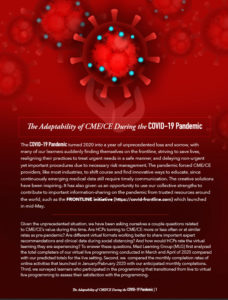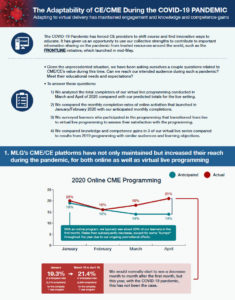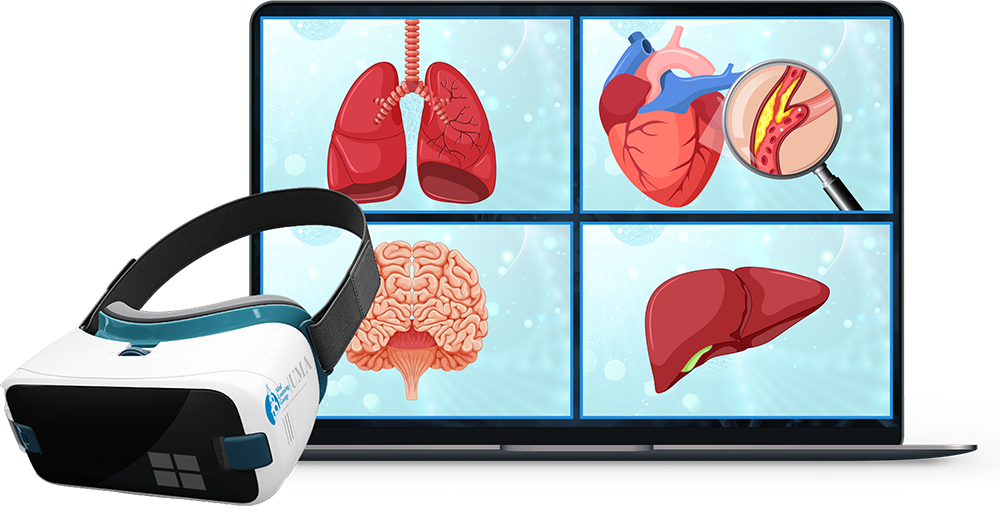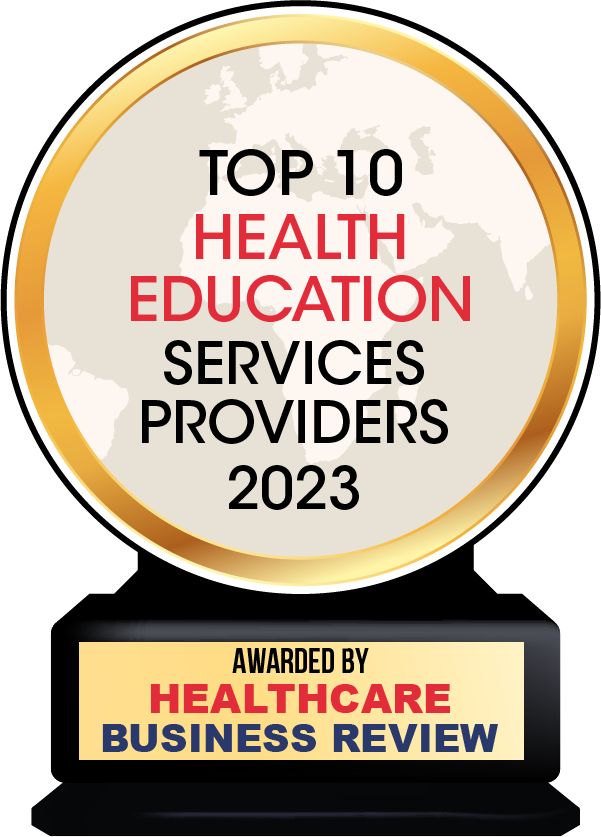
White Papers
The Adaptability of CME/CE During the COVID-19 Pandemic
The COVID-19 Pandemic turned 2020 into a year of unprecedented loss and sorrow, with many of our learners suddenly finding themselves on the frontline, striving to save lives, realigning their practices to treat urgent needs in a safe manner, and delaying non-urgent yet important procedures due to necessary risk management. The pandemic forced CME/CE providers, like most industries, to shift course and find innovative ways to educate, since continuously emerging medical data still require timely communication. The creative solutions have been inspiring. It has also given us an opportunity to use our collective strengths to contribute to important information-sharing on the pandemic from trusted resources around the world, such as the FRONTLINE initiative (https://covid-frontline.com) which launched in mid-May.
Given the unprecedented situation, we have been asking ourselves a couple questions related to CME/CE’s value during this time. Are HCPs turning to CME/CE more or less often or at similar rates as pre-pandemic? Are different virtual formats working better to share important expert recommendations and clinical data during social distancing? And how would HCPs rate the virtual learning they are experiencing? To answer these questions, Med Learning Group (MLG) first analyzed the total completers of our virtual live programming conducted in March and April of 2020 compared with our predicted totals for the live setting. Second, we compared the monthly completion rates of online activities that launched in January/February 2020 with our anticipated monthly completions. Third, we surveyed learners who participated in the programming that transitioned from live to virtual live programming to assess their satisfaction with the programming.
The Adaptability of CE/CME During the COVID-19 PANDEMIC
Adapting to virtual delivery has maintained engagement and knowledge and competence gains
The COVID-19 Pandemic has forced CE providers to shift course and find innovative ways to educate. It has given us an opportunity to use our collective strengths to contribute to important information sharing on the pandemic from trusted resources around the world, such as the FRONTLINE initiative, which launched in mid-May.
- Given the unprecedented situation, we have been asking ourselves a couple questions related to CME/CE’s value during this time. Can we reach our intended audience during such a pandemic?Meet their educational needs and expectations?
- To answer these questions:
- We analyzed the total completers of our virtual live programming conducted in March and April of 2020 compared with our predicted totals for the live setting.
- We compared the monthly completion rates of online activities that launched in January/February 2020 with our anticipated monthly completions.
- We surveyed learners who participated in the programming that transitioned from live to virtual live programming to assess their satisfaction with the programming.
- We compared knowledge and competence gains in 3 of our virtual live series compared to results from 2019 programming with similar audiences and learning objectives.
Creating Communities of Care Through Continuing Education
By: Matthew Frese, Christina Gallo, Andrew Grzybowski, John Guerriero, Brianna Hanson, Lauren Welch, Gretchen Keefer, Nancy Lutz Paynter, and John Ruggiero.
Education is a tool used in the building and development of communities worldwide. Although learning directly affects an individual’s behavior, the context in which these behavioral changes occur is in a setting that involves other people. Research shows that the newfound knowledge obtained by the individual is associated with a wide range of positive outcomes for the community. These outcomes include, first and foremost, better health and wellbeing, as well as higher social trust. Each of these factors can be seen to play a direct role in the success and cooperation witnessed in many thriving communities today. Therefore, the proximate relationship seen between education and community collaboration must not be overlooked.
This white paper is designed to illustrate how CE facilitates partnerships in care and to encourage the CE industry to highlight collaboration as an educational outcome. As we navigate the changing healthcare landscape, collecting evidence of how CE brings together HCPs, patients, patient advocacy groups, and other stakeholders to work as a community to address the challenges of a specific disease will strengthen our role in achieving quality improvement in healthcare and ultimately, improved patient outcomes.
Using VIRTUAL TECHNOLOGY to Advance CME’s Role in Today’s Healthcare Environment
By: Matthew Frese, Christina Gallo, Andrew Grzybowski, Mazi Rasulnia, and Lauren Welch.
The continuing medical education (CME) industry constantly faces the challenge of engaging learners in a manner that facilitates recall and advances practice change. There are new and innovative uses of technologies that provide a more diverse and immersive learning experience, which has the potential to improve CME outcomes. As Dr. Lila Davachi and her colleagues point out, dopamine is an important neurochemical in terms of capturing an individual’s attention, and “varying learning techniques provides additional novelty that can help raise dopamine levels to keep the learner’s attention in the learning environment.”1 In particular, by projecting participants inside a patient’s body and forcing learners to use a variety of senses at once, virtual technologies can better hold their attention, improve their comprehension, and facilitate their recall compared with strictly didactic lessons.
Some of these technologies include virtual reality (VR). VR is “an artificial environment which is experienced through sensory stimuli (as sights and sounds) provided by a computer and in which one’s actions partially determine what happens in the environment.”2 VR is currently applied in a variety of ways in the healthcare industry, such as helping surgeons visualize a surgery, aiding chronic patients in relaxation, allowing long-term patients to participate in outside activities, supporting rehabilitation of traumatized nervous systems, making repetitive motion exercised more fun, to name a few uses.
“Health Literacy and the Pivotal Role of CME in the National Strategy for Quality Improvement in Healthcare”
By: Matthew Frese, Christina Gallo, Andrew Grzybowski, Lori Hall, Helen Kostarides, and Lauren Welch
Each day in this country, adults confront health decisions that may have life-changing consequences. However, our ability to obtain and understand health information is severely inadequate. In fact, nearly nine out of ten adults in the United States have difficulty using health information that is routinely available. We at Med Learning Group consider the current poor state of health literacy an epidemic that demands our collective attention. Without addressing the low health-literacy rate in the United States, we will not be able to provide the optimal quality of healthcare that all of us in the health professions are striving to achieve. We also believe that managing health literacy is integral to fulfilling the objectives of the National Strategy for Quality Improvement in Healthcare.












